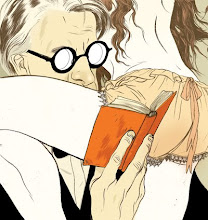And then 2666 really took off. Up until this point, I was a bit unsure how I felt about the book. I liked the tone of the narrator, he or she seemed friendly enough, but the first fifty pages seemed mostly setup. Introductions to characters, their relationships, and this Archimboldi character overtook the first section and I didn’t have much to say. Then the Pakistani cabbie accidently quoted Borges and shit went bananas.
Academia starts bumping up against real life and we begin to see how disconnected from reality these characters may be. After the cabbie let’s the line slip from his lips, Bolano writes that this utterance: “led Espinoza to remark that he’d be damned if the cabbie hadn’t just quoted Borges, who once said London was like a labyrinth—unintentionally of course. To which Norton replied that Dickens and Stevenson had used the same trope long before Borges in their descriptions of London” (73). This, one suspects, sets the cabbie off. He assumes that the academics are making fun of him and proceeds to call Norton a slut. Obviously, there is some miscommunication (I sense this as a growing theme) here, but it leads to a physical encounter.
Really, there are a couple things going on here (we’ll get to the violence and its implications in a second), first of which being the idea of the palimpsest. A palimpsest is, according to dictionary.com, a “typically of papyrus or parchment, that has been written on more than once, with the earlier writing incompletely erased and often legible.” As it was explained to me, a palimpsest was unique in that one would be writing literally on top of what had already written. This is, of course, a fine metaphor for the idea of intertextuality as frequently practiced by postmodern writers. The bit of Bolano I quoted above is one of the best example’s I’ve ever seen, where you have that dizzying moment where the reader thinks of Bolano writing about Borges writing about Dickens and Stevenson. This is a direction I’m certain that 2666 is headed, towards Bolano writing about writing and the artifice of the novel. It’s one of the most consistent postmodern tropes from Borges to Auster. It is also worth examining whether Dickens and Stevenson did this sort of thing as well (All I can remember of Treasure Island is maybe). Of course, writing about writing is what the academics do for a living. Bolano is highlighting the value and the downfalls of this sort of treatment of literature.
Keep in mind, this first part of the book is the part about the “critics,” not about the scholars. Bolano is already proving to be choosing his words carefully and it’s obvious that he isn’t portraying these folks in a glowing light.
This didn’t become apparent until the academics beat up the cabbie. Up to this point, we are presented with highly “civilized” characters who spend a lot time reading (though it often seems that they can’t do it for long), looking out windows, and going to conferences. But when their academic world bumps up against the real world, weird shit happens. Obviously, Bolano wants to show the disconnect between the enlightened critics and actual working folks. This disconnect is put into high relief when the critics begin kicking the cabbie, yelling “shove Islam up your ass…this one is for Salman Rushdie (an author neither of them happened to think was much good but whose mention seemed pertinent), this one is for the feminists of New York…and on and on” (74). Bolano is presenting the critics, the most highly trained minds of the Western world, slipping immediately into essentially gang violence because a cabbie was audacious enough to insult the woman they are both sleeping with.
It seems precisely the point of Bolano to show these people, for all their pretense, as uncivilized. Hypocritical as well, it’s mentioned that Espinoza and Pelletier both vote socialist and are screaming about women’s rights, as it would be assumed that they are individuals who would espouse tolerance. So what is Bolano saying? Other than being an academic doesn’t necessarily make you smart, well, I think it’s too early to tell. There’s a long way to go.
Throw in the painter who cuts off his own hand (which I’m not even going to start unpacking), and we have quite a read on our hands. See you next week, nerds.

No comments:
Post a Comment